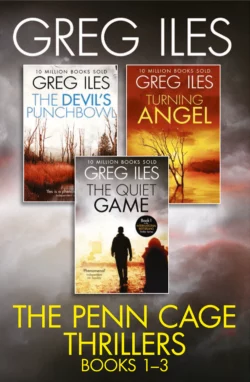Greg Iles 3-Book Thriller Collection: The Quiet Game, Turning Angel, The Devil’s Punchbowl

Greg Iles
Тип: электронная книга
Жанр: Современная зарубежная литература
Язык: на английском языке
Стоимость: 1241.52 ₽
Статус: В продаже
Издательство: HarperCollins
Дата публикации: 16.04.2024
Отзывы: Пока нет Добавить отзыв
О книге: The first three thrillers in the New York Times No.1bestselling series featuring Penn Cage: a man who must face the dark heart of the Deep South – and question everything he believes in . . .THE QUIET GAME: Penn Cage is no stranger to death. As a Houston prosecutor he’s sent sixteen men to death row – and now he’s lost his wife to cancer.Penn returns home to Natchez, Mississippi for a gentler life. But after discovering that his father is being blackmailed over a long-forgotten homicide, Penn is soon up to his neck in the town’s murky undercurrents of passion, power and racial tension.For this is a place with a dark past, where everyone plays the quiet game. But Penn cannot stay silent.TURNING ANGELS: Rape and murder aren’t new to the Deep South, but when the body of a popular high school girl is found dumped in the local river, the whole town of Natchez, Mississippi is shocked.Penn Cage no longer practises law, but when his best friend Drew is accused of the murder and asks for help, Penn must face the hardest questions of his life: Can he defend Drew against the town, the police and overwhelming evidence?Or could it be true that his friend is a brutal killer who has deceived Penn and everyone else?THE DEVIL’S PUNCHBOWL: When he was a prosecuting attorney Penn Cage sent hardened killers to death row. But it is as mayor of his hometown – Natchez, Mississippi – that Penn will face his most dangerous threat.Penn has ridden into office on a tide of support for change. But in its quest for new jobs and fresh money, Natchez has turned to casino gambling. Five fantastical steamboats float on the river, but one isn′t like the others. Rumour has it that the Magnolia Queen has found a way to pull the big players from Las Vegas. With them comes an unquenchable taste for one thing: blood sport, and the dark vices that go with it.When a childhood friend of Penn′s who brings him evidence is brutally murdered, the full weight of Penn′s failure to protect this city hits home. So begins his quest to find the men responsible. And with his family′s life at stake, Penn realizes his only allies in his one-man war are those bound to him by blood or honour.